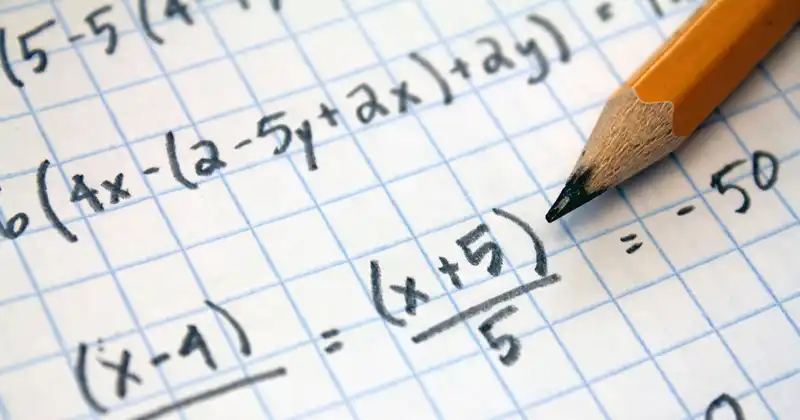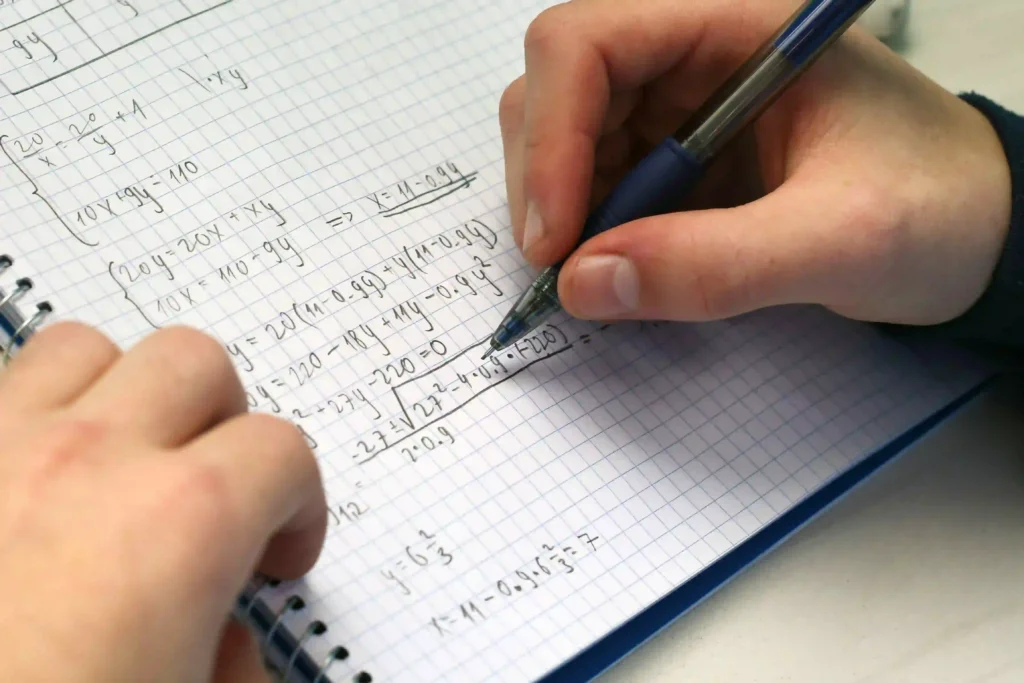Top Tips on how to pass GCSE Maths in 2024:
Use a Study Plan
Having a study plan is key to time management and making sure you cover all the topics in the GCSE Maths course you need to revise before the exam. Start by listing the GCSE maths topics you need to revise and break them down into smaller chunks.

Allocate specific times of the day to each topic and make sure you revisit the harder ones regularly. A balanced plan will also give you time for breaks and not burn out. Use a planner, app or simple calendar to track your progress and stick to your study routine. Revising regularly will help you stay focused and build up your maths skills over the weeks leading up to the GCSE Maths exam.
Focus on Weaknesses
You need to identify your weaknesses early on and spend more time revising those topics. Use Maths GCSE mock exams and diagnostic tests to see where you struggle most, whether it’s algebra, geometry, statistics, or specific areas within the GCSE Maths Foundation Tier or Higher Tier. Once you’ve identified those areas, focus on practising those specific types of questions. Don’t be afraid to ask your maths teacher, tutors or online resources to clarify any tricky concepts. By focusing on the areas where you’re less confident you’ll build up your understanding and increase your chances of getting higher marks in the exam.
A fatal mistake some students make is just doing the topics they’re comfortable with, which doesn’t result in any significant improvement or a better grade in their GCSE Maths exam.
Goal Setting:

Set realistic goals for 2024. Aiming for top marks in your GCSE Maths exams is a great goal to have, but it’s important to set realistic goals that you can actually achieve. It’s also helpful to set short-term goals such as completing a certain number of practice questions per week or studying for a certain amount of time each day.
Past Papers Questions
One of the best ways to revise for GCSE Maths is by doing past exam papers. These will get you used to the exam format, type of questions and time limits. Start by doing a past paper under timed conditions to simulate the real exam. Then go over the mark scheme to see where you got or lost marks. The more you do past papers the more you’ll get used to the types of questions that come up and you’ll also improve your exam time management & technique.

Practice, Practice, and ?
Practise, practise, practise. There is no substitute for practice when it comes to achieving the best grades in your GCSE Maths exam. Find a range of practice questions and work your way through them. Also, make sure you time yourself and challenge yourself with difficult questions.
Getting sufficient practice in is crucial for refining your GCSE exam technique!
Take Breaks
Maths GCSE Revision isn’t just about hours—it’s about focus and not burning out. That’s why taking regular breaks during your GCSE Maths study sessions is key. For example the Pomodoro technique where you study for 25 minutes and then take a 5 minute break will keep your mind fresh. Longer breaks after a few study sessions will also help your brain absorb the information better. By stepping away from your work every now and then you’ll come back with a clearer head and more focus and that will help with retention and understanding of the GCSE Maths material. This will ultimately benefit you in your GCSE maths exams.
Getting help:

Seek help when needed, so don’t be afraid to ask for help if you’re struggling with any GCSE Maths topics. There are lots of online resources available, or you can ask your GCSE Maths tutor for additional help, especially in understanding the mark schemes provided by the exam boards. Our GCSE Maths tutors are accessible outside of lessons so whether it’s right after your lesson or 2 days before your big exam, they’ve got you covered!
Don’t Forget your GCSE Maths Formula Sheet
Having a maths formula sheet can be a powerful revision tool. Write down all the key formulas you need to memorise for topics like algebra, trigonometry and geometry and then practice using them in different questions. This sheet should be concise and only have the most important formulas you’ll need to use during the exam. Having a good grasp of these formulas will help you tackle both simple and complex questions quickly especially when you’re under time pressure.
Focus and motivation:
Stay focused and motivated, because achieving top grades in GCSE Maths requires hard work and dedication. Set yourself rewards for completing tasks, and remind yourself why you’re working hard, such as passing GCSE Maths to boost your chances of doing A level Maths or becoming a doctor, lawyer, etc.

There are various revision techniques to deploy in order to pass GCSE Maths and often the best revision methods for 2024 are the ones you hear all the time, but students don’t always utilise them properly.
Online Resources for Mock Exams
Online resources are a great asset for Maths GCSE exam revision. There are many websites, YouTube channels and apps that have video tutorials, interactive quizzes and practice questions to help reinforce your learning. Websites like BBC Bitesize, Khan Academy and Corbettmaths have explanations for tricky topics, step by step problem solving and even online tests to check your progress. Use these resources along with your textbooks to get a deeper understanding of the difficult GCSE Maths topics and test your knowledge.
GCSE Maths Revision Websites:
Active Revision Techniques
To build your understanding of mathematical concepts you need to use active revision techniques. These include using flashcards to test yourself on key terms, explaining concepts out loud to someone else, or teaching a topic to a friend. Writing summaries, creating mind maps or drawing diagrams of complex problems are also active learning techniques. These methods engage your brain in a way that passively reading notes can’t and make the revision process more interactive and memorable.
Mental Maths
Mental maths is key to solving problems quickly during the GCSE Maths exam especially for questions that require quick calculations. Spend time practicing mental arithmetic without using calculators and focus on common operations like multiplication, division and percentages. As you get better at mental maths you’ll find you can save time on the easier calculations during the exam and focus more on the harder questions.
Know the GCSE Marking Scheme
Knowing the marking scheme is key to getting the best Edexcel Maths GCSE grade. Take time to look through the official mark schemes from past papers and see how marks are awarded for different types of questions. Look out for where you can get method marks even if you don’t get the final answer. Knowing how to show your working and demonstrating a logical problem solving process will get you marks in the exam even if you’re not sure of the answer.
Stay Positive and Focused
Staying positive throughout your revision is just as important as the revision itself. You’ll feel overwhelmed or discouraged at times especially with a tough subject like maths gcse. But having a growth mindset and staying motivated will make a big difference to your performance. Celebrate small wins whether it’s solving a tricky problem or mastering a new topic. Surround yourself with supportive friends, family or tutors who can encourage you when you’re stuck. Remember consistent effort and self belief is key to success.
When your GCSE Maths exam is approaching, get into exam mode and remember all the things you’ve learnt 😊
What happens if you fail?
In 2020 and 2021, Maths GCSE exams were cancelled and final grades were based on teachers’ assessments and/or predictions. Therefore, not that many students failed their GCSE Maths.
As things are returning to normality, exams are taking place in person and in some circumstances, students may fail. There are many reasons for failing GCSE Maths, but some common reasons include ineffective studying techniques and lack of focus, which are crucial to pass GCSE Maths. It is paramount to identify the reasons for failing an exam in order to reflect and avoid it in future.
Consequences of failing GCSE Maths?
The consequences of failing your GCSE Maths depends on your circumstances and the specific requirements of your school and/or sixthform or college you’re wishing to apply to.

Sometimes, failing your Maths exams may mean that you need to resit the GCSE Maths papers in order to progress to further education or apprenticeship. It is important to speak with your school or a career counsellor to ensure that you’re well informed of your choices.
Can I resit my GCSE Maths if I fail?
Retaking GCSE Maths is an option if you fail them, however in most instances, you will be required to wait until the next exam sitting period to retake the exams, while in other cases you may be able to retake them sooner. The availability of these exams will vary depending on which GCSE exam board you’re sitting your exams with, such as AQA or Pearson Edexcel.

